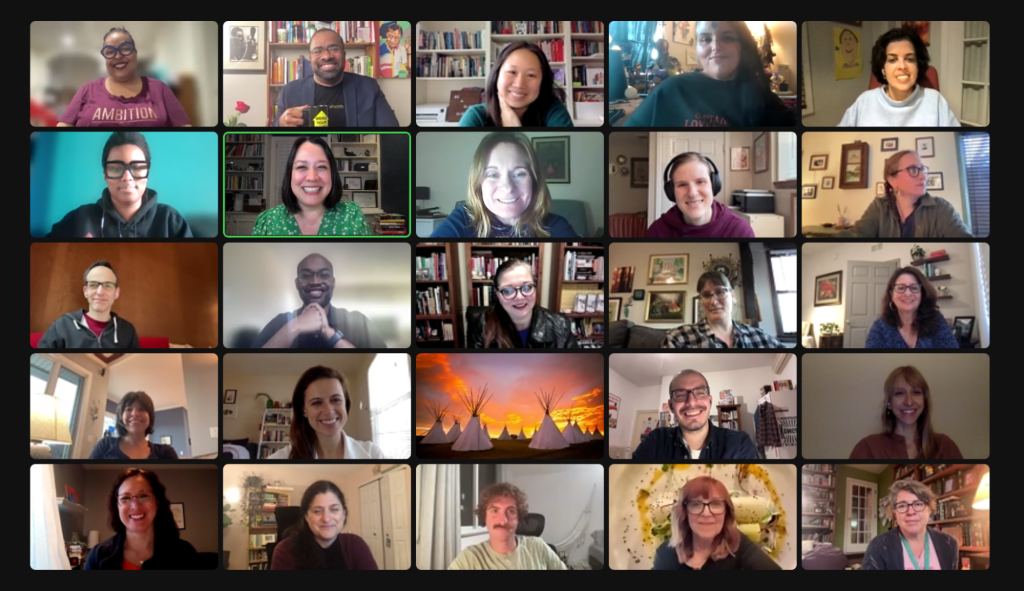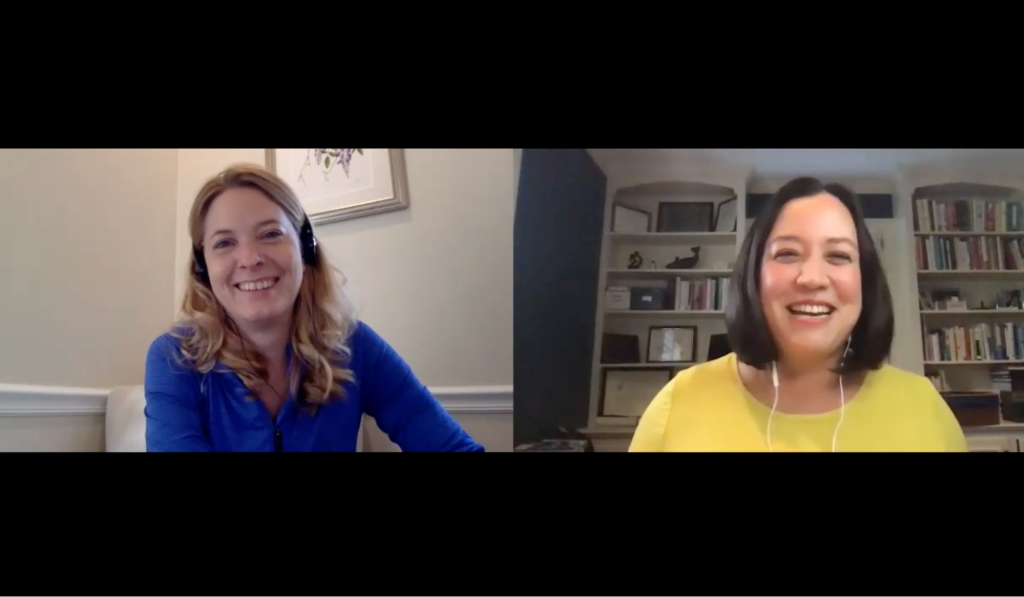![Katherine Reynolds Lewis, Sylvia A. Harvey [SAH], Katherine Fraser, Shernay Williams and Megy Karydes at the IIJ’s 2024 workshop on the business of freelancing. Courtesy of Katherine Lewis Katherine Reynolds Lewis, Sylvia A. Harvey [SAH], Katherine Fraser, Shernay Williams and Megy Karydes at the IIJ’s 2024 workshop on the business of freelancing. Courtesy of Katherine Lewis](https://rjionline.org/wp-content/uploads/sites/2/2024/09/lewisk24091002-1024x576.jpg)
Katherine Reynolds Lewis, Sylvia A. Harvey [SAH], Katherine Fraser, Shernay Williams and Megy Karydes at the IIJ’s 2024 workshop on the business of freelancing. Courtesy of Katherine Lewis
Embedding accountability in your freelance journalism practice
How a cohort and trusted colleagues can help you reach your goals faster
I was recently chatting on the phone with a promising new freelance journalist, whose full-time job ended and sent her looking for community and advice. As the founder of the Institute for Independent Journalists, whose mission is the sustainability of freelancers of color, I get quite a few requests like this. I offered a few leads for assignments and validated her experience of struggling with unresponsive editors. (It’s rough out there!) But as we wrapped up, I could feel her reluctance to say goodbye. She didn’t want to let go of the lifeline that another independent journalist can provide.
Before signing off, I encouraged her to reach out to other new freelancers at her level of practice to find an accountability buddy or group. I would not have been as successful as I have been in my career — writing a book, launching a speaking career, becoming a graduate journalism school instructor, or creating a social enterprise — if I didn’t have a whole crew of trusted colleagues both cheerleading me and refusing to let me sell myself short. Indeed, that peer accountability is powerful in a different way than having a great boss or mentor, because it travels with you from job to job, and you advance together. There are a few ways that a cohort or trusted colleagues can show up, and I encourage both new and experienced freelancers to try them out — it could be the boost that your career needs right now.
A chosen cohort of peers
When I was a brand-new independent journalist 15 years ago, I assumed that other freelancers were my competition and I’d be better off with my head down, working in solitude. I spent the first two months grinding out pitches to dream publications, completing first assignments for new outlets, calling up former colleagues to network, and waking up to do it all over again. I burned out within the season. I was lonely. I wondered why I was sitting at my desk in my home office for 8 hours straight, when I had the freedom to do whatever I wanted, for the first time in my career as a journalist.
That empty feeling prompted me to reach out to colleagues who were freelancing in the Washington D.C. area, as I was. I suggested lunch or coffee. Just getting out of the house once or twice a month boosted my mood and productivity. But when I found a freelance business group led by Amy Rogers Nazarov, my practice really transformed.
Here’s how it works
We meet once a month in the DC area, close to a metro stop but with decent parking. Ideally, a coffee shop where you can nurse a drink for 90 minutes without catching side eye. We each take turns giving an update on our work and challenges, and asking for advice, leads or other help from the group. We use a timer to make sure everybody shares the floor. (Amy has since turned over the group to new leadership, having launched a social media management business.) Over the course of an hour or 75 minutes, we commiserate, warn each other off bad clients, and problem solve thorny issues of rate setting, marketing, client relationships and more. Over months and years, we built trust that made us comfortable sharing client names, income goals, work-in-progress and other sensitive information.
A key unexpected benefit: we held each other accountable. As each of us navigated bumps in the freelance road, we learned from each other. We grew together. We began to spot each other’s weak spots, and to call each other out. This might look like a gentle nudge to submit the fellowship application after talking about it for the past four meetings. Or a query about what was holding me back from pitching an ambitious story: was it that I had self-doubt regarding my ability to pull it off? Or perhaps, it was the kind of story I thought I should want to do — but didn’t actually relish reporting and writing.
This group helped me learn the power of a cohort to help you reach your goals. I loved the experience so much that when the pandemic hit, and grounded my long-form narrative and investigative reporting, my first thought was to create a new cohort of colleagues pursuing similarly ambitious projects.
This group ended up morphing into the IIJ after months of support and accountability. Now, our annual conference always includes a networking session or two at which we encourage participants to find and create accountability partners and groups. I love hearing reports back about the friendships and professional collaborations that have resulted from those groups.

Accountability buddies give one-on-one support
For some people, an accountability group seems too exposed or nebulous — different people show up each week, and you don’t have the same level of trust with each one. In those cases, an accountability partner may be a better fit. You’ll gain access to a smaller variety of opinions and experiences, but with more privacy and the opportunity to build a deeper connection.
I first tried having an accountability partner when I wanted to write my first long-form story, and was pulling together a pitch. The daily and weekly grind of freelancing made it hard to prioritize the reading, research, reporting and thinking needed for a magazine piece. A friend from my first job in journalism agreed to check in once a week to set goals and report back.
The first week was a bit disappointing. Neither of us had met our goals, but we forgave each other. We chatted a bit and then set goals for the following week. The next week: same story. By the third week, we didn’t even bother checking in. The whole experiment was a flop.
A few years later, I had written a story for Fortune about career coaches, and Laura Vanderkam — a colleague I admired — reached out. She complimented the article and said she’d always wondered if a career coach would help her. Given that Laura is a time management and productivity author and podcaster, I said that she probably could level up her work if she just had an accountability partner to hold her to her goals. Somehow, she agreed to be my accountability partner if I would be hers. (I definitely got the better end of that deal.)
Laura and I have solved so many of each other’s problems over the subsequent decade. First off, we wrote about our partnership for Fortune, earning us each an article fee! She helped me pay attention to how many of my ambitious professional goals were taking a back seat to planning Girl Scout meetings or the routine feature stories that I could churn out easily. When I was having trouble finding the time to report a long-form pitch on school discipline, she helped me see that the beginning of the week was a better time to tackle the reporting than the end of the week. In the time it took me to report and write that 900 word pitch, she wrote an entire novel. (The pitch sold to Mother Jones, went viral, and landed me an agent and book deal, so I don’t feel bad at all.)
We’ve also collaborated and supported each other’s work publicly. I’ve been on her podcast and she’s been on my Facebook live. When either of us has a new book or project, the other often uses it as writing fodder or supports it in another way. She’s spoken at IIJ events and for other professional associations that I organized, and I’ve been part of her summer reads series. I cherish the deep and long standing relationship that began with a casual email exchange about a story she liked.

Formal cohort programs
The third way you can build accountability into your journalism practice is through a formal fellowship, leadership or other cohort program. For example, the RJI fellowship that I’m engaged in right now. The other fellows’ commitment to their projects and ideas energizes me, and their questions stimulate my brain to work in new directions. You can also explicitly ask for help with accountability, and extend the cohort past the official end date of the program.
As a freelancer, you need to set your own goals and create your own structure. An accountability partner or group can be a key piece of support.
Cite this article
Lewis, Katherine Reynolds (2024, Sept. 11). Embedding accountability in your freelance journalism practice. Reynolds Journalism Institute. Retrieved from: https://rjionline.org/news/embedding-accountability-in-your-freelance-journalism-practice/
